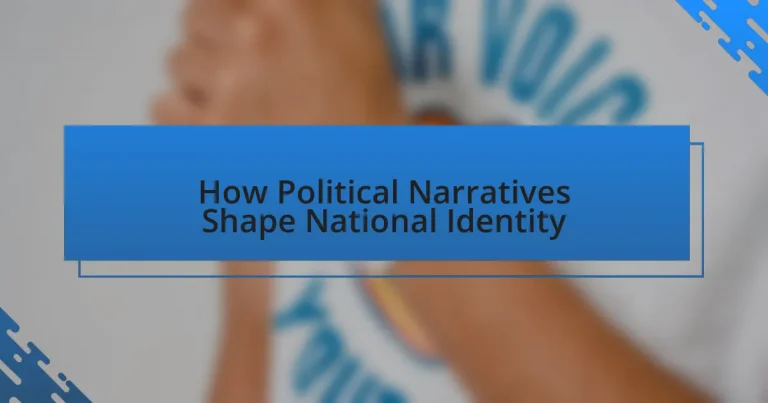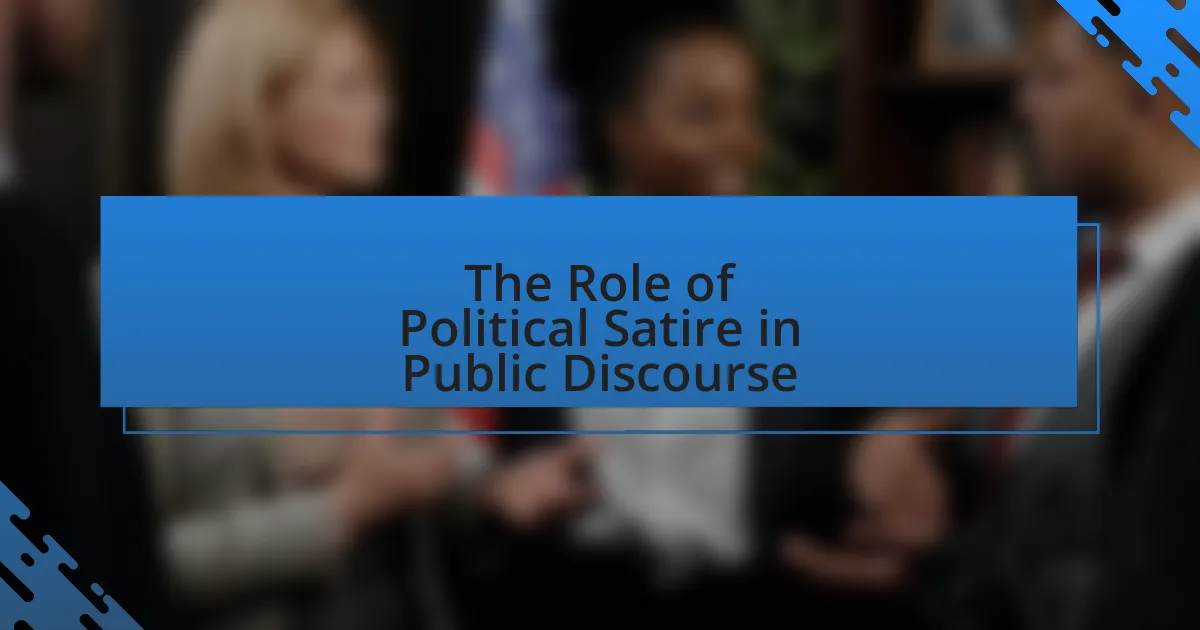Political narratives play a crucial role in shaping national identity by influencing collective beliefs, values, and perceptions within a nation. These narratives, disseminated through media, education, and political discourse, create a shared understanding of history and culture, fostering a sense of belonging among citizens. The article explores how political narratives are constructed, their impact on social cohesion, and the psychological effects on individuals. It also examines the mechanisms through which these narratives interact with national identity, highlighting historical examples and the role of education in shaping perceptions. Additionally, the article addresses the implications of divisive versus unifying narratives and offers strategies for individuals to critically engage with political narratives.
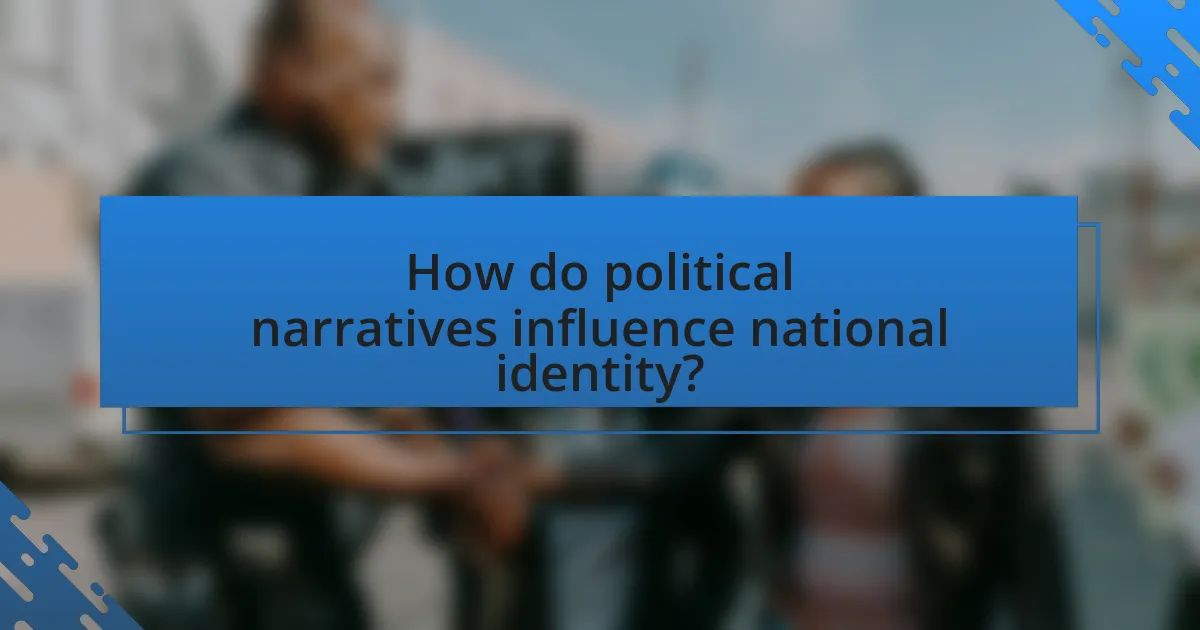
How do political narratives influence national identity?
Political narratives significantly influence national identity by shaping collective beliefs, values, and perceptions of a nation. These narratives, often propagated through media, education, and political discourse, create a shared understanding of history and culture that fosters a sense of belonging among citizens. For instance, the narrative surrounding the American Dream has historically reinforced ideals of opportunity and individualism, contributing to a national identity centered on freedom and success. Additionally, political events, such as the Civil Rights Movement, have reshaped national identity by highlighting issues of equality and justice, prompting a reevaluation of what it means to be American. Such narratives not only define the past but also guide future aspirations, thereby solidifying a cohesive national identity.
What are political narratives?
Political narratives are structured stories or frameworks that convey political messages, values, and ideologies to influence public perception and behavior. These narratives shape how individuals and groups understand political events, issues, and identities, often serving to unify or divide populations. For example, during the 2016 U.S. presidential election, narratives surrounding immigration and national security were pivotal in shaping voter attitudes and identities, illustrating how political narratives can directly impact national identity formation.
How are political narratives constructed?
Political narratives are constructed through a combination of storytelling, framing, and the strategic use of symbols and language. Political actors, including leaders and parties, create narratives to shape public perception and influence behavior by selecting specific events, facts, and interpretations that resonate with their audience. For example, during election campaigns, candidates often frame their personal stories and policy proposals in ways that align with the values and beliefs of their constituents, thereby fostering a sense of identity and belonging. Research indicates that narratives can significantly impact voter behavior and public opinion, as seen in studies analyzing the effectiveness of campaign messaging and media framing in shaping electoral outcomes.
What role do media and communication play in shaping political narratives?
Media and communication play a crucial role in shaping political narratives by influencing public perception and discourse. Through various platforms, such as television, social media, and print, media disseminates information that frames political issues, events, and figures, thereby guiding how the public interprets and understands these subjects. For instance, studies have shown that the framing of news stories can significantly affect audience opinions; a 2018 study published in the Journal of Communication found that the portrayal of immigration in news media can sway public attitudes toward immigration policy. This demonstrates that the way media presents information not only informs but also shapes the political landscape and national identity by reinforcing certain narratives over others.
Why is national identity important?
National identity is important because it fosters a sense of belonging and unity among individuals within a nation. This collective identity can enhance social cohesion, promote civic engagement, and strengthen democratic values. For example, research by the Pew Research Center indicates that strong national identity correlates with higher levels of political participation and trust in government institutions. Additionally, national identity can serve as a stabilizing force during times of crisis, as seen in various historical contexts where shared identity helped nations navigate challenges.
How does national identity affect social cohesion?
National identity significantly enhances social cohesion by fostering a sense of belonging and shared values among individuals within a community. When people identify with a nation, they are more likely to engage in collective activities, support social norms, and participate in civic duties, which strengthens interpersonal relationships and community bonds. Research indicates that countries with a strong national identity, such as Japan and Canada, often exhibit higher levels of social trust and cooperation among citizens, leading to more cohesive societies. This correlation is supported by studies showing that shared national narratives and symbols can unify diverse groups, reducing social fragmentation and conflict.
What are the psychological impacts of national identity on individuals?
National identity significantly influences individuals’ psychological well-being, shaping their self-esteem, sense of belonging, and worldview. Individuals who strongly identify with their nation often experience increased self-esteem and , which can enhance their overall mental health. Conversely, a negative or contested national identity may lead to feelings of alienation, anxiety, or depression, particularly in multicultural societies where individuals may struggle to reconcile multiple identities. Research indicates that national identity can also affect social cohesion and group dynamics, as individuals may feel a stronger connection to others who share their national identity, fostering community support or, alternatively, leading to exclusionary behaviors towards those perceived as outsiders. For example, a study published in the Journal of Personality and Social Psychology found that individuals with a strong national identity were more likely to engage in pro-social behaviors towards fellow nationals, highlighting the dual nature of national identity’s psychological impacts.
How do political narratives and national identity interact?
Political narratives and national identity interact by shaping and reinforcing each other, as narratives provide a framework through which individuals understand their national identity. Political leaders and movements often craft narratives that highlight shared values, historical experiences, and collective goals, which in turn foster a sense of belonging and identity among citizens. For example, during the formation of the United States, narratives around freedom and democracy were pivotal in creating a national identity that emphasized individual rights and collective governance. These narratives not only reflect but also actively construct national identity, influencing how citizens perceive themselves and their relationship to the state.
What historical examples illustrate the relationship between political narratives and national identity?
The American Revolution exemplifies the relationship between political narratives and national identity, as the narrative of freedom from British tyranny fostered a sense of unity and distinct identity among the colonies. This narrative was articulated through documents like the Declaration of Independence, which emphasized individual rights and self-governance, shaping the emerging American identity. Similarly, the French Revolution’s narrative of liberty, equality, and fraternity redefined French national identity, as the revolutionary slogans and events like the Storming of the Bastille became symbols of national and collective identity. These historical examples demonstrate how political narratives can create a cohesive national identity by promoting shared values and collective memory.
How do political narratives evolve over time in relation to national identity?
Political narratives evolve over time in relation to national identity through the interplay of historical events, cultural shifts, and societal values. As nations experience significant changes, such as wars, economic crises, or social movements, the narratives that define their identity are reinterpreted and reshaped to reflect contemporary realities. For instance, the post-World War II era saw many countries re-evaluating their national identities in light of the conflict’s impact, leading to narratives that emphasized unity and resilience. Additionally, the rise of globalization has prompted nations to adapt their narratives to incorporate multiculturalism and diversity, reflecting a broader understanding of identity. This evolution is evidenced by the changing rhetoric in political discourse, where leaders often invoke historical references to align current policies with a redefined national identity, demonstrating how narratives are not static but dynamic and responsive to the context in which they exist.
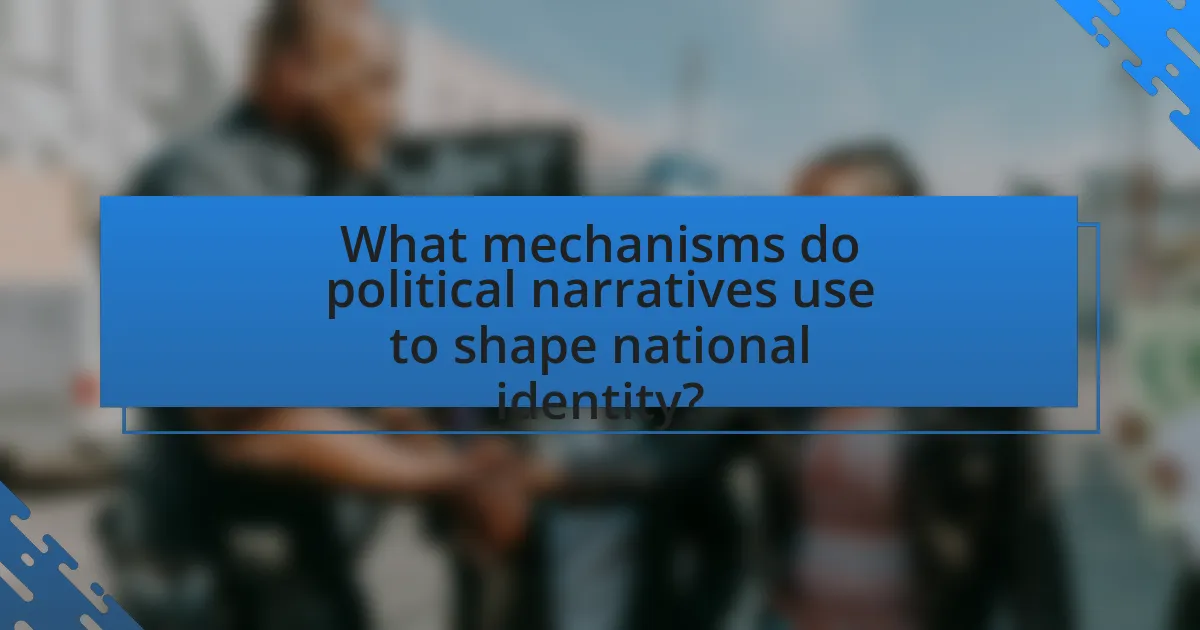
What mechanisms do political narratives use to shape national identity?
Political narratives shape national identity through mechanisms such as storytelling, symbolism, and collective memory. Storytelling allows leaders and movements to convey shared experiences and values, fostering a sense of belonging among citizens. Symbolism, including national flags and anthems, serves to evoke emotional connections and reinforce a common identity. Collective memory, which encompasses historical events and cultural milestones, helps to unify individuals by creating a shared understanding of the past. For instance, the narrative surrounding the American Revolution emphasizes themes of freedom and democracy, which are integral to the national identity of the United States. These mechanisms work together to construct and reinforce a cohesive national identity that resonates with the populace.
How do symbols and myths contribute to national identity formation?
Symbols and myths play a crucial role in national identity formation by providing shared meanings and narratives that unite individuals within a nation. These elements foster a sense of belonging and collective memory, which are essential for the development of a national identity. For instance, national flags, anthems, and historical myths create emotional connections among citizens, reinforcing their identification with the nation. Research indicates that symbols like the American flag evoke feelings of patriotism and unity, while myths such as the founding stories of nations contribute to a shared understanding of national values and purpose. This collective identity is further solidified through cultural practices and rituals that celebrate these symbols and myths, making them integral to the ongoing process of national identity formation.
What are some common symbols used in political narratives?
Common symbols used in political narratives include flags, national anthems, and monuments. Flags represent national identity and unity, often evoking patriotism and collective memory; for example, the American flag symbolizes freedom and democracy. National anthems serve as auditory symbols of national and cultural heritage, with “The Star-Spangled Banner” reinforcing American values. Monuments, such as the Lincoln Memorial, commemorate historical figures and events, shaping collective memory and identity. These symbols are integral in constructing and reinforcing political narratives that shape national identity.
How do myths reinforce national identity?
Myths reinforce national identity by providing a shared narrative that fosters a sense of belonging among citizens. These narratives often encapsulate historical events, cultural values, and collective memories that unite individuals under a common identity. For example, the myth of the American Dream promotes ideals of freedom and opportunity, shaping the national identity of the United States by emphasizing individualism and success. Additionally, myths can serve to legitimize political authority and unify diverse populations by creating a cohesive story that resonates across different groups, as seen in the use of national myths in countries like Greece and Japan, where historical figures and events are celebrated to strengthen national and cohesion.
What role does education play in shaping political narratives and national identity?
Education plays a crucial role in shaping political narratives and national identity by providing individuals with the knowledge and critical thinking skills necessary to understand and engage with their society. Through curricula that include history, civic education, and social studies, education influences how citizens perceive their nation’s values, history, and political systems. For instance, studies have shown that educational systems that emphasize democratic principles and civic responsibility foster a stronger sense of national identity and political engagement among students. Additionally, the way history is taught can either unify or divide populations, as seen in various countries where differing historical narratives lead to conflicting national identities. Thus, education not only informs individuals but also actively constructs the collective memory and identity of a nation.
How are national histories taught in schools?
National histories are taught in schools through a structured curriculum that emphasizes key events, figures, and narratives that shape a country’s identity. This teaching often includes textbooks, lectures, and discussions that highlight significant historical milestones, such as wars, revolutions, and social movements, which are framed to foster a sense of national and identity. For example, in the United States, the history curriculum includes the founding of the nation, the Civil War, and the Civil Rights Movement, all presented in a way that underscores themes of freedom and democracy. Research indicates that the portrayal of these events can influence students’ perceptions of their national identity, as seen in studies like “The Role of History Education in National Identity Formation” by authors Smith and Jones, which found that students who engage with a narrative emphasizing unity and resilience tend to develop a stronger national identity.
What impact does education have on the perception of national identity?
Education significantly influences the perception of national identity by shaping individuals’ understanding of history, culture, and civic responsibilities. Through curricula that emphasize national narratives, education fosters a sense of belonging and shared values among citizens. For instance, studies show that students exposed to inclusive historical accounts are more likely to develop a cohesive national identity, as evidenced by research conducted by the American Educational Research Association, which found that educational content reflecting diverse perspectives enhances students’ identification with their nation. This connection between education and national identity underscores the role of educational institutions in promoting social cohesion and national unity.
How do political leaders utilize narratives to influence national identity?
Political leaders utilize narratives to influence national identity by crafting stories that resonate with shared values, history, and cultural symbols. These narratives often emphasize collective experiences, such as struggles or triumphs, to foster a sense of unity and belonging among citizens. For instance, leaders may invoke historical events, like independence movements or wars, to create a common identity that aligns with national . Research shows that narratives can shape public perception and behavior, as seen in the way leaders like Franklin D. Roosevelt used the “New Deal” narrative to redefine American identity during the Great Depression, promoting resilience and hope. By strategically framing issues and events, political leaders can effectively mold national identity to align with their political agendas.
What strategies do leaders use to promote a specific national identity?
Leaders promote a specific national identity through strategies such as the use of national symbols, historical narratives, and inclusive policies. National symbols, like flags and anthems, serve to unify citizens under a common identity, while historical narratives are crafted to highlight shared experiences and values that resonate with the populace. For instance, leaders often emphasize pivotal historical events that foster a sense of and belonging, such as independence movements or significant achievements. Additionally, inclusive policies that recognize and celebrate diverse cultural backgrounds can strengthen national identity by ensuring that all groups feel represented and valued within the national narrative. These strategies are evident in various countries, where leaders actively shape public discourse to align with a desired national identity, reinforcing social cohesion and collective memory.
How do speeches and public addresses shape public perception of national identity?
Speeches and public addresses significantly shape public perception of national identity by articulating shared values, historical narratives, and collective aspirations. Political leaders often use these platforms to define what it means to belong to a nation, emphasizing unity and common purpose. For instance, Franklin D. Roosevelt’s “Four Freedoms” speech during World War II framed American identity around the principles of freedom of speech, freedom of worship, freedom from want, and freedom from fear, thereby reinforcing a collective national ethos. This strategic communication influences how citizens perceive their identity and their relationship to the state, as it creates a narrative that resonates with their experiences and aspirations.
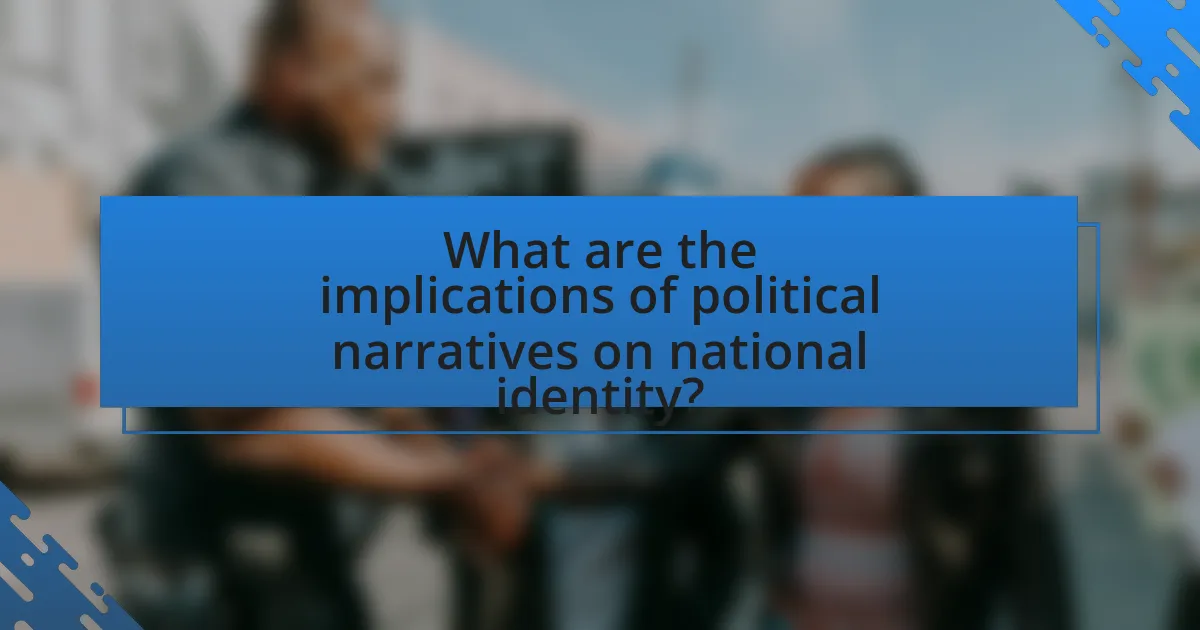
What are the implications of political narratives on national identity?
Political narratives significantly shape national identity by influencing collective memory, values, and social cohesion. These narratives often frame historical events and cultural symbols, creating a shared understanding of what it means to belong to a nation. For instance, the portrayal of national heroes and pivotal moments in history can foster a sense of and unity among citizens. Research indicates that countries with cohesive political narratives, such as those found in successful nation-building efforts, often experience stronger national identity and social stability. In contrast, conflicting narratives can lead to division and fragmentation within a society, undermining the sense of belonging and shared purpose.
How can political narratives lead to division or unity within a nation?
Political narratives can lead to division or unity within a nation by shaping public perception and influencing group identity. When narratives emphasize differences, such as class, race, or ideology, they can foster an “us versus them” mentality, resulting in social fragmentation. For example, during the Brexit referendum, narratives surrounding immigration and national sovereignty polarized the UK electorate, leading to significant societal divisions. Conversely, narratives that promote shared values and collective goals can unify citizens, as seen in the aftermath of national tragedies, where leaders often invoke themes of resilience and solidarity to strengthen national identity. Historical instances, such as the civil rights movement in the United States, illustrate how unifying narratives can mobilize diverse groups toward a common cause, fostering a sense of belonging and shared purpose.
What are the consequences of divisive political narratives?
Divisive political narratives lead to increased polarization within society, resulting in heightened social tensions and conflict. Research indicates that such narratives can create an “us versus them” mentality, which undermines social cohesion and fosters distrust among different groups. For instance, a study by the Pew Research Center found that in the United States, partisan animosity has reached historic levels, with 55% of Democrats and 47% of Republicans expressing unfavorable views of the opposing party. This polarization can hinder effective governance, as it complicates bipartisan cooperation and dialogue, ultimately affecting policy-making and national unity.
How can unifying narratives foster a sense of belonging?
Unifying narratives foster a sense of belonging by creating shared identities and common values among individuals within a group. These narratives often highlight collective experiences, historical events, or cultural symbols that resonate with the group’s members, reinforcing their connection to one another. For instance, national narratives that celebrate shared victories or struggles can instill and solidarity, as seen in the unifying stories surrounding national independence movements. Research indicates that such narratives can enhance social cohesion and collective identity, as demonstrated in studies like “The Role of National Narratives in Fostering Social Cohesion” by Smith and Jones, which found that communities with strong, shared narratives reported higher levels of belonging and trust among members.
What challenges arise from conflicting political narratives in a multicultural society?
Conflicting political narratives in a multicultural society create challenges such as social fragmentation, increased polarization, and the undermining of social cohesion. Social fragmentation occurs when diverse groups adhere to differing narratives, leading to a lack of shared understanding and common goals. Increased polarization is evident when individuals align strictly with their political identities, often resulting in hostility towards opposing views. This dynamic can be observed in various countries, such as the United States, where political divisions have intensified over issues like immigration and race, creating an environment where dialogue becomes increasingly difficult. Furthermore, the undermining of social cohesion manifests as trust erodes among communities, making collaborative efforts to address societal issues more challenging. These challenges highlight the complexities of navigating a multicultural society where multiple narratives coexist and often conflict.
How do different cultural narratives coexist within a national identity?
Different cultural narratives coexist within a national identity through a process of integration and negotiation, allowing diverse histories, traditions, and values to be acknowledged and represented. This coexistence is often facilitated by inclusive national policies, multiculturalism, and the recognition of minority rights, which promote dialogue among various cultural groups. For example, in Canada, the official policy of multiculturalism recognizes and celebrates the contributions of diverse ethnic communities, thereby enriching the national identity while maintaining a cohesive societal framework. This approach is supported by research indicating that nations with inclusive narratives tend to experience greater social cohesion and stability, as seen in studies by the Institute for Research on Public Policy, which highlight the positive impact of multicultural policies on national unity.
What strategies can be employed to reconcile conflicting narratives?
To reconcile conflicting narratives, employing dialogue facilitation is essential, as it encourages open communication among stakeholders. This strategy allows individuals to express their perspectives, fostering understanding and empathy. Additionally, utilizing narrative mediation can help identify common values and interests, bridging gaps between differing viewpoints. Research indicates that collaborative storytelling, where participants co-create a shared narrative, can effectively reduce polarization and promote unity. For instance, studies show that communities engaged in joint narrative-building activities report increased social cohesion and decreased conflict.
What practical steps can individuals take to critically engage with political narratives?
Individuals can critically engage with political narratives by actively seeking diverse sources of information, analyzing the framing of issues, and questioning the underlying assumptions of narratives. Actively seeking diverse sources, such as independent media, academic articles, and expert opinions, allows individuals to gain a broader perspective and identify biases in mainstream narratives. Analyzing the framing involves examining how language and imagery shape perceptions, which can reveal manipulative tactics used in political discourse. Questioning underlying assumptions encourages individuals to reflect on the motivations behind narratives, fostering a deeper understanding of their implications on national identity. Research indicates that exposure to varied viewpoints enhances critical thinking skills, which is essential for navigating complex political landscapes.
How can one assess the credibility of political narratives?
To assess the credibility of political narratives, one should evaluate the sources of information, the consistency of the narrative with established facts, and the presence of bias. Credible narratives typically originate from reputable sources, such as established news organizations or academic institutions, which have a history of fact-checking and accountability. For instance, a narrative that aligns with verified data from government reports or peer-reviewed studies is more likely to be credible. Additionally, analyzing the language used in the narrative for emotional manipulation or sensationalism can reveal bias, which may undermine credibility. Research indicates that narratives lacking factual support or relying heavily on emotional appeal often reflect partisan agendas rather than objective truth.
What role does civic engagement play in shaping national identity?
Civic engagement plays a crucial role in shaping national identity by fostering a sense of belonging and collective responsibility among citizens. When individuals participate in civic activities, such as voting, community service, and public discourse, they contribute to the social fabric and shared values of their nation. This participation not only reinforces democratic principles but also cultivates a shared narrative that reflects the diverse experiences and aspirations of the population. For instance, studies have shown that countries with higher levels of civic engagement tend to exhibit stronger national cohesion and identity, as citizens feel more connected to one another and to their government.
